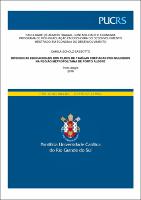| Share record |


|
Please use this identifier to cite or link to this item:
https://tede2.pucrs.br/tede2/handle/tede/8066Full metadata record
| DC Field | Value | Language |
|---|---|---|
| dc.creator | Bassotto, Camila Scholz | - |
| dc.contributor.advisor1 | Marquetti, Adalmir Antônio | - |
| dc.contributor.advisor1Lattes | http://lattes.cnpq.br/3474246821206609 | por |
| dc.date.accessioned | 2018-05-18T17:56:03Z | - |
| dc.date.issued | 2018-03-28 | - |
| dc.identifier.uri | http://tede2.pucrs.br/tede2/handle/tede/8066 | - |
| dc.description.resumo | O conceito de chefia familiar está se alterando para que seja identificado como chefe a pessoa que é responsável pela família. A chefia familiar feminina, no entanto, ainda pode estar associada a normas culturais que impedem que a mulher seja chefe de família na presença de um homem. Nesses casos, as mulheres são consideradas chefes apenas em famílias monoparentias, e essas famílias são associadas ao fenômeno da feminização da pobreza. Sabe-se que a educação dos pais tem grande influência na educação dos filhos; por isso, esse trabalho objetivou verificar se a chefia familiar feminina influencia na educação dos filhos, no período de 1996, 2006 e 2016, na região metropolitana de Porto Alegre. Construiu-se um modelo e processou-se a base de dados da PED – Pesquisa de Emprego e Desemprego –, utilizando o software IBM SPSS Statistics 20, em uma regressão linear. Entre os resultados, destacam-se: o sinal positivo para o coeficiente da variável da educação da mãe; o sinal negativo do coeficiente estimado para família chefiada por mulher; e o sinal positivo verificado na variável da mulher ser chefe de família combinada com ter alta educação. | por |
| dc.description.abstract | The concept of household headship is changing so that the person who is responsible for the family itself is identified as the head of household. Female household headship, however, may still be associated with cultural norms that prevent a woman from being the head of household in the presence of a man. In these cases, women are only considered as heads in single-parent families, and these families are associated with the phenomenon of the feminization of poverty. It is known that parental education has a great influence on the education of children; Therefore, this study aimed to verify if the female household headship influences the education of the children, in the period of 1996, 2006 and 2016, in the metropolitan region of Porto Alegre. A model was constructed and the database of PED – Pesquisa de Emprego e Desemprego - was processed using the IBM SPSS Statistics 20 software, in a linear regression. Among the results the following stands out: the positive sign for the coefficient of the mother's education variable, the negative sign of the coefficient estimated for the female household headship and the positive sign found in the variable of women as head of household combined with women having high education. | eng |
| dc.description.provenance | Submitted by PPG Economia do desenvolvimento ([email protected]) on 2018-05-14T20:59:27Z No. of bitstreams: 1 CAMILA_SCHOLZ_BASSOTTO_DIS.pdf: 1091873 bytes, checksum: 069bd1ec39aa86dc6b8dbde103ef48fb (MD5) | eng |
| dc.description.provenance | Approved for entry into archive by Sheila Dias ([email protected]) on 2018-05-18T17:42:04Z (GMT) No. of bitstreams: 1 CAMILA_SCHOLZ_BASSOTTO_DIS.pdf: 1091873 bytes, checksum: 069bd1ec39aa86dc6b8dbde103ef48fb (MD5) | eng |
| dc.description.provenance | Made available in DSpace on 2018-05-18T17:56:03Z (GMT). No. of bitstreams: 1 CAMILA_SCHOLZ_BASSOTTO_DIS.pdf: 1091873 bytes, checksum: 069bd1ec39aa86dc6b8dbde103ef48fb (MD5) Previous issue date: 2018-03-28 | eng |
| dc.description.sponsorship | Coordenação de Aperfeiçoamento de Pessoal de Nível Superior - CAPES | por |
| dc.format | application/pdf | * |
| dc.thumbnail.url | http://tede2.pucrs.br:80/tede2/retrieve/172116/CAMILA_SCHOLZ_BASSOTTO_DIS.pdf.jpg | * |
| dc.language | por | por |
| dc.publisher | Pontifícia Universidade Católica do Rio Grande do Sul | por |
| dc.publisher.department | Escola de Negócios | por |
| dc.publisher.country | Brasil | por |
| dc.publisher.initials | PUCRS | por |
| dc.publisher.program | Programa de Pós-Graduação em Economia do Desenvolvimento | por |
| dc.rights | Acesso Aberto | por |
| dc.subject | Chefia Familiar | por |
| dc.subject | Mulher Chefe de Família | por |
| dc.subject | Educação | por |
| dc.subject | PED | por |
| dc.subject.cnpq | CIENCIAS SOCIAIS APLICADAS::ECONOMIA | por |
| dc.title | Diferenças educacionais dos filhos de famílias chefiadas por mulheres na região metropolitana de Porto Alegre | por |
| dc.type | Dissertação | por |
| dc.restricao.situacao | Trabalho não apresenta restrição para publicação | por |
| Appears in Collections: | Programa de Pós-Graduação em Economia do Desenvolvimento | |
Files in This Item:
| File | Description | Size | Format | |
|---|---|---|---|---|
| CAMILA_SCHOLZ_BASSOTTO_DIS.pdf | CAMILA_SCHOLZ_BASSOTTO_DIS | 1.07 MB | Adobe PDF |  Download/Open Preview |
Items in DSpace are protected by copyright, with all rights reserved, unless otherwise indicated.




